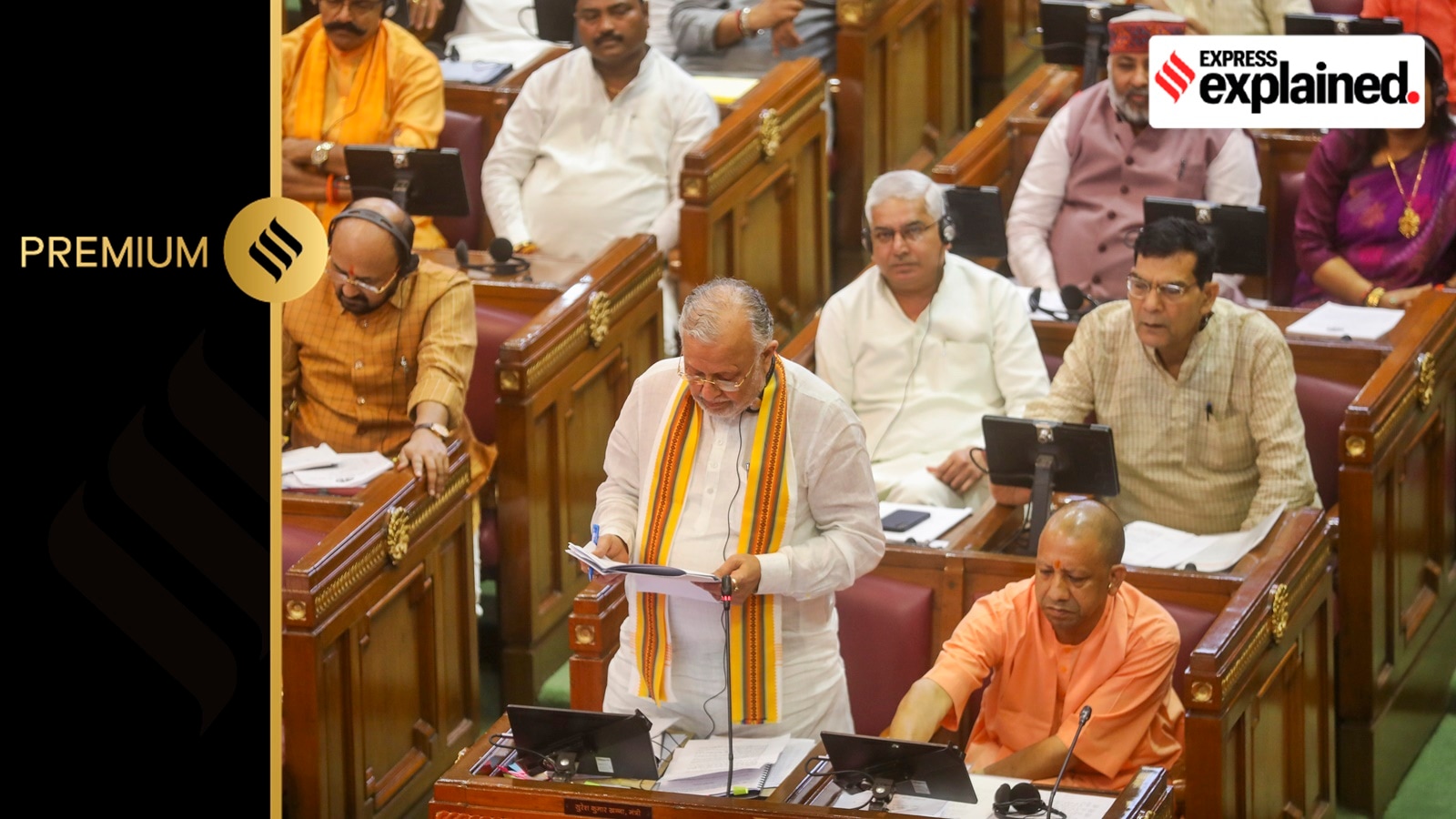© The Indian Express Pvt Ltd
Latest Comment
Post Comment
Read Comments
 Uttar Pradesh Finance Minister Suresh Khanna presents a supplementary budget in the presence of Chief Minister Yogi Adityanath and other members during the Monsoon session of state Legislative Assembly at Vidhan Bhawan, in Lucknow, Tuesday, July 30, 2024. (PTI Photo/Nand Kumar)
Uttar Pradesh Finance Minister Suresh Khanna presents a supplementary budget in the presence of Chief Minister Yogi Adityanath and other members during the Monsoon session of state Legislative Assembly at Vidhan Bhawan, in Lucknow, Tuesday, July 30, 2024. (PTI Photo/Nand Kumar)The Uttar Pradesh Prohibition of Unlawful Conversion of Religion Act, 2021, which prohibits religious conversion through “unlawful” means, was passed by the state assembly four years ago. On Tuesday (July 30), the assembly passed an amendment to this Act, making it stricter and more widely enforceable.
Why was the amendment brought in?
The Amendment was introduced by the BJP government in UP with the stated aim of protecting certain groups of people, including minors, people with disabilities, women, and persons belonging to Scheduled Caste (SC) and Scheduled Tribe (ST) communities.
It says that the penal provisions under the 2021 Act were “not sufficient to prevent and control religious conversion and mass conversion” of persons belonging to these groups.
This reflects the view expressed by Justice Rohit Ranjan Agarwal of the Allahabad High Court on July 1. In his order rejecting a bail application filed by an accused under the 2021 Act, he stated that “unlawful activity of conversion of people of SC/ST castes and… economically poor persons into Christianity is being done at rampant pace throughout the State of Uttar Pradesh”.
The Amendment is also set to resolve certain difficulties that have arisen in the past pertaining to Section 4 of the 2021 Act which allowed “Any aggrieved person, his/her parents, brother, sister, or any other person who is related to him/her by blood, marriage or adoption” to file an FIR for unlawful conversion with the police.
The Allahabad High Court, on at least two occasions in 2023, has held that the phrase “any aggrieved person” does not mean that anyone can file an FIR for unlawful conversion. In September 2023, in the case of Jose Papachen vs. State of Uttar Pradesh, the court held that this phrase is “qualified” and “completely whittled down” by the categories that follow it (parents, brother, sister, etc). The court gave a similar analysis in a February 2023 order in the Fatehpur Mass Conversion case.
What changes does the Amendment introduce to the 2021 Act?
The Amendment removes restrictions on who can file an FIR, proposes stringent bail conditions similar to those for accused persons in terrorism and money laundering cases, and increases the punishment for unlawful conversion.
n ‘Any person’ can file FIR
The Amendment changes the wording of Section 4 to address the aforementioned “difficulties”. The revised provision states that “any person” can file an FIR related to violation of the 2021 Act in the manner provided under the new law governing criminal procedure, the Bharatiya Nagarik Suraksha Sanhita, 2023 (BNSS).
Under Section 173 of the BNSS, which deals with the registration of an FIR, information regarding a crime can be given to the officer in charge of a police station “irrespective of the area where the offence is committed”. This means that any individual can approach any police station to file an FIR for alleged crimes under the Act.
*Strict bail conditions
Section 3 of the 2021 Act punishes religious conversion through “misrepresentation, force, undue influence, coercion, allurement or by any fraudulent means”, which also includes “conversion by solemnisation of marriage or relationship in the nature of marriage” through the use of the listed illegal means.
For those accused under Section 3, the Amendment introduces stringent bail conditions that are akin to the bail conditions under the Prevention of Money Laundering Act, 2002, and the Unlawful Activities (Prevention) Act, 1967.
Under the new Section 7, an accused cannot be released on bail unless two conditions have been met. First, the public prosecutor (the advocate representing the state government prosecuting the crime) must be given the opportunity to oppose the bail application.
Second, the court must be satisfied that there are “reasonable grounds for believing that he is not guilty of such an offence and that no offence can be committed by him while on bail”.
*Enhancement of punishments
Apart from increasing the years of imprisonment under Section 5 of the Act (refer to the box), the Amendment also adds two new categories of offences.
First, if the accused has received money from “foreign or illegal institutions” in connection with unlawful conversion, they may be punished with 7-14 years imprisonment and a fine of at least Rs. 10,00,000.
Second, if the accused causes any person to “fear of his life or property, assaults or uses force, promises or instigates marriage, conspires or induced any minor, woman or person to traffics or otherwise sells them”, they shall be punished with a minimum 20 years imprisonment which can be extended to life imprisonment.
With the inclusion of “promises or instigates marriage” in the category of offences that carries a prison sentence of 20 years to life, the Amendment greatly enhances the punishment for unlawful conversion through marriage from a maximum of the previous maximum of 10 years.
With other BJP-ruled states such as Uttarakhand, Gujarat, and Madhya Pradesh having enacted similar anti-conversion laws, Uttar Pradesh’s Amendment could see them follow suit.
That said, such laws have been challenged in court by various individuals and organisations such as the NGO Citizens for Justice and Peace (CJP) and the Jamiat-Ulama-i-Hind. CJP has filed a petition seeking to transfer all the challenges to anti-conversion laws before various High Courts to the Supreme Court.
The apex court is yet to rule on the matter.